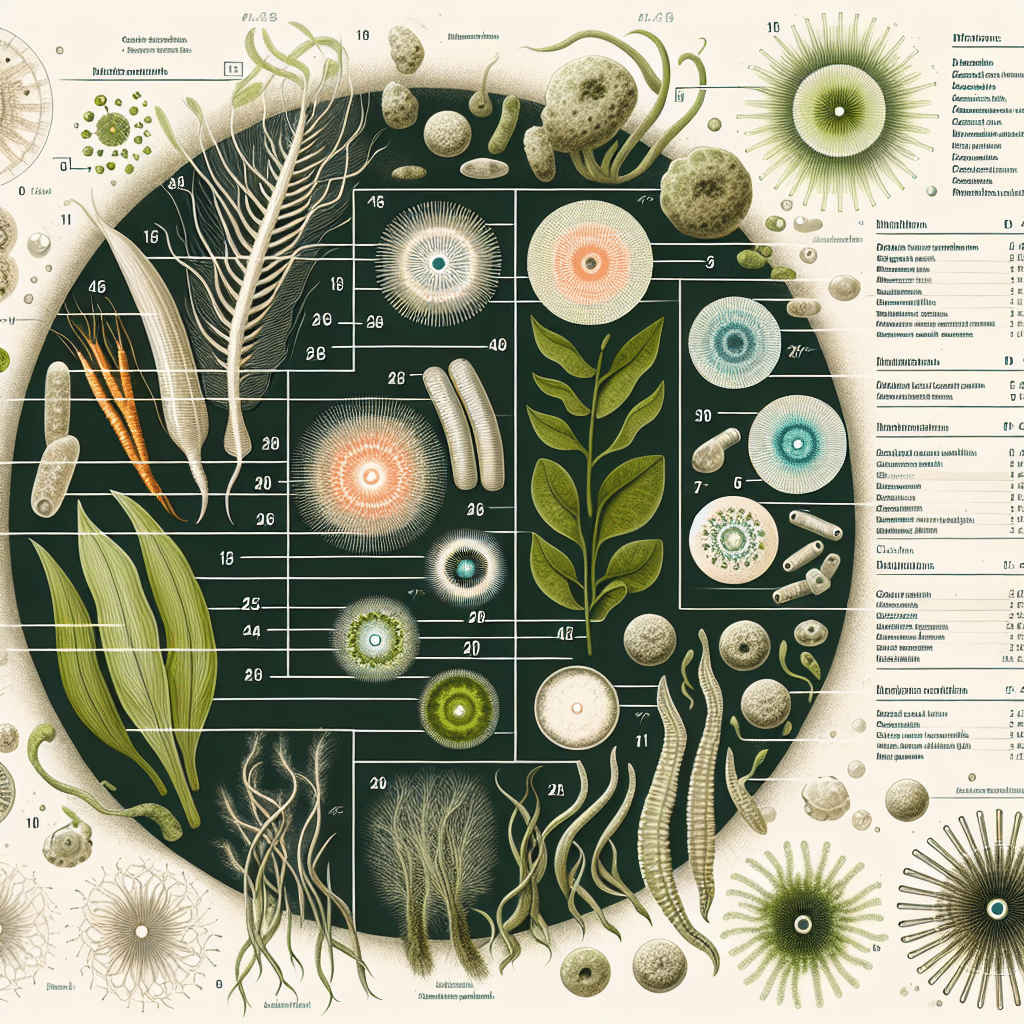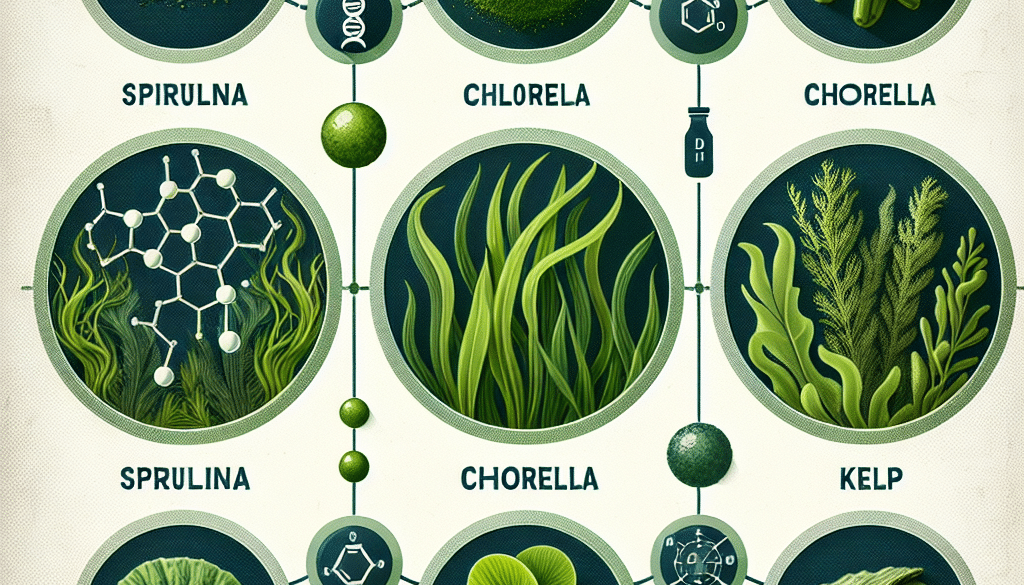Which Algae Is Best For Nutrition?
-
Table of Contents
- Top Algae Varieties for Optimal Nutritional Benefits
- Understanding the Nutritional Power of Algae
- Microalgae: Spirulina and Chlorella
- Spirulina: The Blue-Green Alga
- Chlorella: The Green Alga
- Macroalgae: Kelp and Nori
- Kelp: The Brown Seaweed
- Nori: The Sushi Wrapper
- Comparative Studies and Nutritional Analysis
- Algae in the Diet: Practical Considerations
- Environmental Impact and Sustainability
- Conclusion: The Best Algae for Nutrition
- Discover ETprotein’s High-Quality Protein Products
Top Algae Varieties for Optimal Nutritional Benefits

Algae, often referred to as the superfoods of the sea, have been a staple in various cultures for centuries. With the growing interest in plant-based nutrition and sustainable food sources, algae have garnered significant attention for their nutritional profile and health benefits. This article explores the different types of algae that are best for nutrition, supported by scientific research, case studies, and statistics.
Understanding the Nutritional Power of Algae
Algae are simple, plant-like organisms that range from microscopic (microalgae) to large seaweeds (macroalgae). They are rich in vitamins, minerals, antioxidants, and other bioactive compounds. Algae are also a sustainable source of protein, making them an attractive option for those looking to reduce their environmental footprint.
Microalgae: Spirulina and Chlorella
When it comes to nutritional content, microalgae like Spirulina and Chlorella are at the forefront.
Spirulina: The Blue-Green Alga
- Protein Content: Spirulina is composed of about 60-70% protein, which is complete with all essential amino acids, making it an excellent protein source for vegetarians and vegans.
- Vitamins and Minerals: It is rich in B vitamins, particularly vitamin B12, iron, and beta-carotene, which the body can convert into vitamin A.
- Antioxidant Properties: Spirulina contains phycocyanin, a pigment with potent antioxidant and anti-inflammatory properties.
Chlorella: The Green Alga
- Detoxifying Effects: Chlorella is known for its ability to bind to heavy metals and other toxins, aiding in detoxification.
- Nutrient-Dense: It is a rich source of chlorophyll, omega-3 fatty acids, fiber, and also contains a good amount of protein.
- Immune Support: Studies suggest that Chlorella can help boost the immune system and improve the body’s response to infections.
Macroalgae: Kelp and Nori
Macroalgae, commonly known as seaweeds, are also packed with nutrients and have unique health benefits.
Kelp: The Brown Seaweed
- Iodine Source: Kelp is one of the best natural sources of iodine, which is crucial for thyroid function.
- Mineral-Rich: It contains calcium, magnesium, potassium, and iron.
- Alginate Content: Kelp contains alginates that can help reduce fat absorption and promote gut health.
Nori: The Sushi Wrapper
- Protein and Fiber: Nori has a balanced composition of protein and dietary fiber.
- Vitamin C: It is surprisingly high in vitamin C, which is uncommon for seaweeds.
- B12 for Vegetarians: Nori is one of the few plant sources of bioavailable vitamin B12, making it particularly valuable for vegetarians and vegans.
Comparative Studies and Nutritional Analysis
Several studies have compared the nutritional profiles of different algae. For instance, a study published in the Journal of Applied Phycology found that Spirulina and Chlorella had higher protein content compared to other algae. Another study highlighted that Spirulina had superior essential amino acid composition, making it an ideal protein supplement.
Furthermore, the United Nations Food and Agriculture Organization (FAO) has recognized Spirulina as a potential solution to malnutrition due to its dense nutrient composition and ease of cultivation.
Algae in the Diet: Practical Considerations
Incorporating algae into the diet can be simple. Spirulina and Chlorella are available in powder or tablet form, making them easy to add to smoothies, juices, or as a supplement. Kelp can be used in soups, salads, or as a seasoning, while Nori is commonly used to wrap sushi and can also be enjoyed as a snack.
Environmental Impact and Sustainability
Algae cultivation has a low environmental impact compared to traditional agriculture. It requires less land and water and can be grown in areas unsuitable for other crops. Algae also absorb carbon dioxide and can help mitigate climate change.
Conclusion: The Best Algae for Nutrition
In conclusion, both Spirulina and Chlorella stand out as the best algae for nutrition due to their high protein content, comprehensive range of vitamins and minerals, and health-promoting properties. Kelp and Nori also offer unique benefits and can be included in a balanced diet for their iodine and vitamin B12 content, respectively. When choosing algae for nutrition, it is essential to consider individual dietary needs, potential allergies, and product quality.
Discover ETprotein’s High-Quality Protein Products
If you’re looking for high-quality protein sources to complement your diet, consider ETprotein’s range of organic bulk vegan proteins. Their products, including organic rice protein, pea protein, and various seed proteins, are characterized by a neutral taste, non-GMO, and allergen-free attributes. ETprotein’s offerings cater to a diverse range of industries and are ideal for those seeking sustainable and nutritious protein options.
About ETprotein:
ETprotein, a reputable protein and L-(+)-Ergothioneine (EGT) Chinese factory manufacturer and supplier, is renowned for producing, stocking, exporting, and delivering the highest quality organic bulk vegan proteins and L-(+)-Ergothioneine. They include Organic rice protein, clear rice protein, pea protein, clear pea protein, watermelon seed protein, pumpkin seed protein, sunflower seed protein, mung bean protein, peanut protein, and L-(+)-Ergothioneine EGT Pharmaceutical grade, L-(+)-Ergothioneine EGT food grade, L-(+)-Ergothioneine EGT cosmetic grade, L-(+)-Ergothioneine EGT reference grade and L-(+)-Ergothioneine EGT standard. Their offerings, characterized by a neutral taste, non-GMO, allergen-free attributes, with L-(+)-Ergothioneine purity over 98%, 99%, cater to a diverse range of industries. They serve nutraceutical, pharmaceutical, cosmeceutical, veterinary, as well as food and beverage finished product distributors, traders, and manufacturers across Europe, USA, Canada, Australia, Thailand, Japan, Korea, Brazil, and Chile, among others.
ETprotein specialization includes exporting and delivering tailor-made protein powder and finished nutritional supplements. Their extensive product range covers sectors like Food and Beverage, Sports Nutrition, Weight Management, Dietary Supplements, Health and Wellness Products, and Infant Formula, ensuring comprehensive solutions to meet all your protein needs.
As a trusted company by leading global food and beverage brands and Fortune 500 companies, ETprotein reinforces China’s reputation in the global arena. For more information or to sample their products, please contact them and email sales(at)ETprotein.com today.














